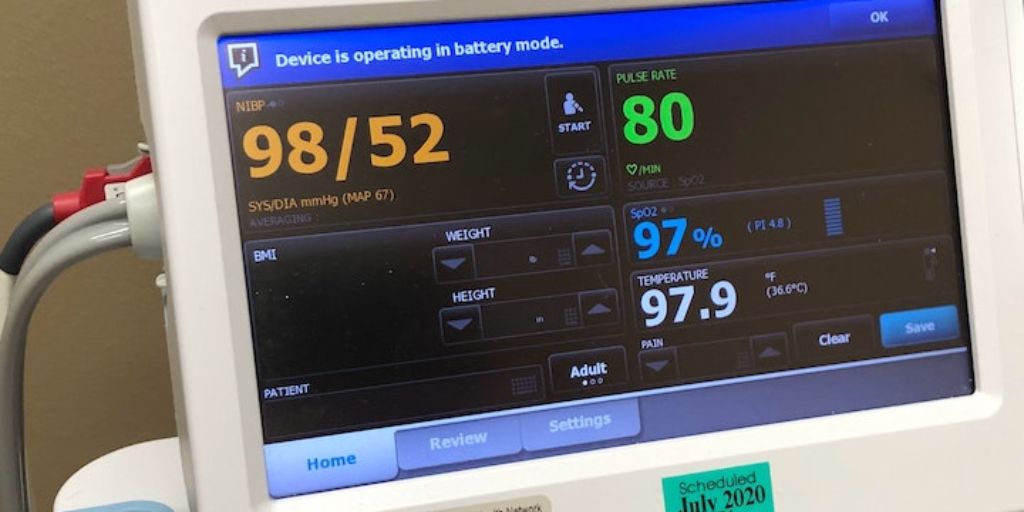
Student nurses and allied healthcare professionals (AHPs) at Huddersfield University are being offered placements in two local hospitals to open their eyes and minds to the possibilities of digital healthcare.
The pioneering scheme – thought to be one of the first in the UK – will proactively expose the participants to technology already being used at Huddersfield Royal Infirmary, Calderdale Royal Hospital, in Halifax, and in the community, with the aim of creating digitally-savvy clinicians, who can then become digital champions of the future.
It has evolved thanks to a collaboration between senior leaders at the university, Calderdale and Huddersfield NHS Foundation Trust (CHFT), which runs the hospitals involved, and The Health Informatics Service (THIS) – which is hosted by CHFT – and whose digital expertise has helped to make the trust one of the most digitally mature and paper light in the country.
Bethen Hebberd, a Senior Lecturer and Head of Practice Based Learning (AHPs and Midwifery), at Huddersfield University says: “The innovative, interdisciplinary digital skills placement is a fantastic example of future-focused practice education.
“It will allow our students to gain insight into how data is used to inform service delivery and how it’s aiding a variety of aspects of modern healthcare practice.
“The placement is designed to make the students more confident in exploring the advances in digital healthcare, which should aid in creating the healthcare professionals that are required in the future. The opportunity to apply digital skills in a healthcare context in an engaging way will, in my opinion, be invaluable.”
The ultimate aim of what is being seen as an organic pilot scheme is to add breadth and depth by extending the duration of the placements, currently five days, and the clinical disciplines participating in them. The next step will be to include student midwives and physiotherapists before extending it further.
Digital health solutions to improve patient care and safety
The placement idea evolved following a visit to the university to look at its plans for an innovation hub, which included a tour of the current simulation suites, and where it was clear how embedded the use of digital technology is within nursing, AHP and midwife roles.
Digital health solutions to improve patient care and safety are well embedded in the day-to-day work of clinicians within CHFT, many of them pioneered by the technical expertise of THIS staff in collaboration with their clinical colleagues.
Driven by CHFT’s digitally aspirant culture, the ambition of the placements also recognises the Phillips Ives Nursing and Midwifery Review to ensure nurses and midwives are empowered to practice and lead in a digitally-enabled health and social care system.
Louise Croxall, CHFT’s Chief Nurse Information Officer (CNIO), says: “With the Phillips Ives Review report due in spring, we think this is placing the students at the forefront of what it is looking to achieve, especially the person-centred element of nursing in a place-based health and social care system and the emerging technologies and opportunities, including remote care.
“The future is growing for digital in nursing and we are opening up that opportunity for students to experience and hopefully choose it as a career path. It’s also encouraging the students to look at digital healthcare and hopefully they can bring ideas of digital solutions in the future and help to shape the future of nursing education.”
Rob Birkett, CHFT’s Chief Digital and Information Officer (CDIO), says: “This is the first of a number of initiatives between CHFT and the University of Huddersfield. It is a great example of both collaboration with one of our partners and the further alignment of digital with the day-to-day provision of compassionate care here at CHFT; as well as preparing our clinicians of the future for a local career in a modern health and social care system.”
Quality improvement project
The placements, which begin in this month, will see the students working with critical outreach and respiratory teams, the speech and language therapy (SALT) team and district nurses. It will introduce them to virtual consultations with patients being treated at home, exposing them to real time data documentation and how it can benefit multi-disciplinary team scenarios.
They will be introduced to the role of Chief Nurse Information Officer (CNIO), and given presentations on how data is used to improve and shape services for the future and build on quality improvements such as monitoring documentation standards
The first planned follow-up for the initial cohort is a quality improvement project arising from time spent with the SALT team. They will be tasked with creating a leaflet illustrating best practice for staff conducting virtual consultations with patients with communication difficulties – part of CHFT’s drive to tackle health inequalities that will also feature among the briefings and presentations lined up for the students.
In addition to including all healthcare disciplines in the project, a further aspiration is to share the model with NHS colleagues in other trusts and universities so they can contribute to the creation of a national blueprint for digital health education and training.








